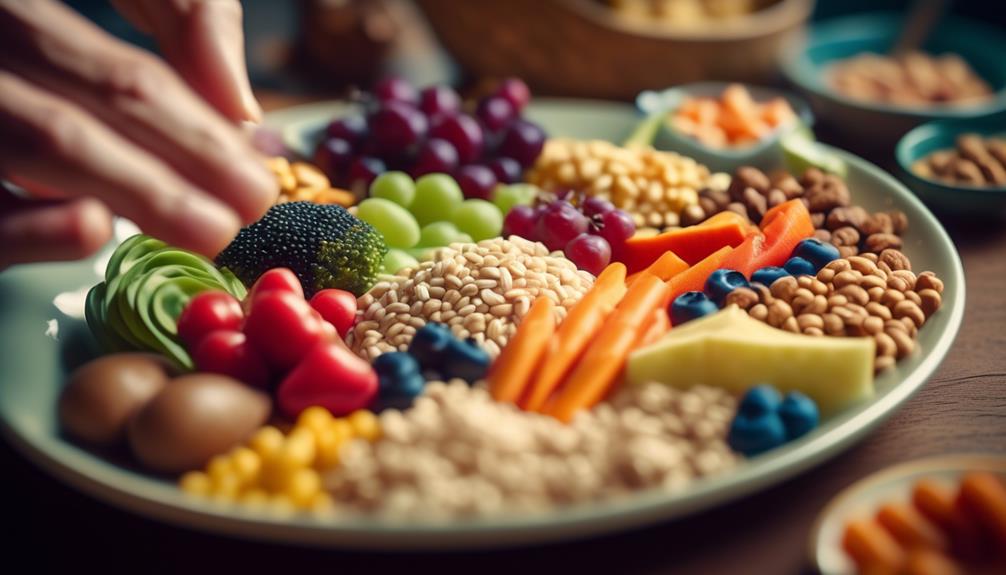Are you tired of feeling like you're stuck in a never-ending cycle of weight loss plateaus on your keto journey? Well, fear not, because there is hope!
Breaking through these stubborn plateaus may seem like an insurmountable task, but with the right strategies and tweaks to your diet and lifestyle, you can finally kickstart your weight loss once again.
So, if you're ready to discover the secrets to overcoming these frustrating plateaus and achieving your keto goals, then keep reading. Trust us, it'll be worth it.
Understanding Keto Weight Loss Plateaus

If you've hit a weight loss plateau while following the keto diet, it's important to understand the reasons behind it and how to overcome this obstacle. Evaluating your progress is crucial in determining why your weight loss has stalled.
One possibility is that you're simply not in a calorie deficit anymore. While the keto diet can help you naturally reduce your calorie intake, it's still possible to consume too many calories if you're not mindful of portion sizes or if you're indulging in high-calorie keto-friendly foods.
Another factor to consider is the composition of your meals. Are you consuming enough protein to support muscle growth and repair? Are you eating enough fiber to promote satiety and proper digestion? Troubleshooting these challenges can help you break through your weight loss plateau.
Additionally, fluctuations in water retention can mask fat loss on the scale. Make sure you're staying hydrated and consider measuring other indicators of progress, such as body measurements or changes in clothing fit.
Evaluating Your Current Keto Diet
To evaluate your current keto diet and overcome weight loss plateaus, there are several points you should consider.
First, assess your macros and calories to ensure you're in the appropriate range for weight loss.
Next, identify any hidden carbohydrates in your diet, such as condiments or processed foods, that may be hindering your progress.
Lastly, adjust your protein intake to optimize fat burning and muscle preservation.
Assessing Macros and Calories
Have you assessed your macros and calories to evaluate your current keto diet?
Assessing macros and evaluating calories are crucial steps in understanding how your body is responding to the ketogenic diet and can help you break through weight loss plateaus.
Macros, short for macronutrients, refer to the three main components of your diet: fats, proteins, and carbohydrates. By tracking and evaluating the amount of each macronutrient you consume, you can ensure that you're maintaining the proper balance for your body's needs.
Additionally, monitoring your calorie intake is essential for weight loss as it determines the energy balance in your body.
Identifying Hidden Carbohydrates
Now let's focus on identifying hidden carbohydrates in your current keto diet, a crucial step in evaluating its effectiveness. Identifying carb sources is essential to ensure you're staying within your desired carbohydrate limit.
While you may be aware of obvious carb sources like bread, pasta, and sugary snacks, there are hidden carb sources to watch out for as well.
One common hidden carb source is condiments and sauces. Ketchup, barbecue sauce, and salad dressings often contain added sugars and can quickly add up in carbohydrate content.
Another hidden carb source is certain fruits. While fruits are generally healthy, some like bananas, grapes, and pineapples are higher in carbohydrates compared to others like berries.
Processed and packaged foods can also be sneaky sources of hidden carbs. Always check the nutrition labels for hidden sugars and carbohydrate content. Ingredients like maltodextrin, dextrose, and corn syrup indicate the presence of carbohydrates.
Adjusting Protein Intake
Adjusting your protein intake is a crucial aspect of evaluating the effectiveness of your current keto diet. Protein plays a vital role in weight loss and muscle building, making it essential to ensure you're getting the right amount from the right sources. Here are some key points to consider:
- Protein sources: Evaluate the types of protein you're consuming. Opt for lean sources such as chicken, turkey, fish, and tofu, which provide essential amino acids without excess fat or carbohydrates.
- Protein requirements: Assess whether you're meeting your daily protein needs. The average adult requires around 0.8 grams of protein per kilogram of body weight, but this may vary depending on your specific goals and activity level.
- Protein timing: Consider when you're consuming protein throughout the day. Distributing your protein intake evenly across meals can help optimize muscle protein synthesis and support weight loss.
- Protein quality: Ensure you're consuming complete proteins that contain all essential amino acids. By diversifying your protein sources, you can ensure you're getting a wide range of nutrients.
Tracking Your Macros and Calories
To effectively manage your keto weight loss plateau, it's essential to track your macros and calories diligently. Evaluating macros and counting calories can help you stay on track and make adjustments as needed.
Tracking your macros involves monitoring your intake of carbohydrates, protein, and fat. On a ketogenic diet, it's crucial to keep your carbohydrate intake low and increase your fat consumption. By evaluating your macros, you can ensure that you're meeting your nutritional needs while staying within the appropriate ranges for each macronutrient.
Counting calories is equally important in managing your weight loss plateau. While the ketogenic diet focuses on the type of nutrients you consume, it's still essential to maintain a calorie deficit to lose weight. By tracking your calorie intake, you can determine if you're consuming too many or too few calories. Adjusting your calorie intake can help break through the plateau and promote continued weight loss.
Fortunately, there are several tools available to help you track your macros and calories. Mobile apps, websites, and food diaries can assist you in monitoring your intake and making necessary adjustments. By diligently tracking your macros and calories, you can overcome your weight loss plateau and continue on your ketogenic journey.
Incorporating Intermittent Fasting

Incorporating intermittent fasting can be a beneficial strategy to overcome a keto weight loss plateau. By incorporating mindfulness and being conscious of meal timing, you can optimize your fasting window and boost your weight loss efforts. Here are some key points to consider:
- Mindfulness: Intermittent fasting encourages a mindful approach to eating. By limiting your eating window, you become more aware of your hunger cues and are less likely to engage in mindless snacking or overeating.
- Meal Timing: Intermittent fasting allows you to schedule your meals strategically. Consider fasting for 16 hours and having an 8-hour eating window. This can help regulate insulin levels, improve metabolic flexibility, and enhance fat burning.
- Improved Insulin Sensitivity: Intermittent fasting has been shown to improve insulin sensitivity. This means that your body becomes more efficient at using carbohydrates and fats for energy, leading to better weight management.
- Enhanced Autophagy: Intermittent fasting promotes autophagy, a cellular process that helps remove damaged cells and promotes cellular renewal. This can support weight loss by increasing metabolic efficiency and reducing inflammation.
Incorporating intermittent fasting into your keto diet can be a powerful tool to break through weight loss plateaus. However, it's important to consult with a healthcare professional before making any significant changes to your eating patterns.
Increasing Physical Activity
Increase your physical activity to boost your weight loss efforts while on the keto diet. Incorporating regular exercise into your routine can help you break through weight loss plateaus and achieve your desired results. Trying new activities can keep your workouts exciting and prevent boredom, making it easier to stay motivated and committed to your fitness goals.
Exercise offers numerous benefits that go beyond just weight loss. It helps increase your metabolism, allowing you to burn more calories throughout the day. Additionally, physical activity helps build lean muscle mass, which can improve your body composition and increase your overall strength and endurance. Regular exercise also improves cardiovascular health, reduces the risk of chronic diseases, and enhances mental well-being.
To maximize the benefits of exercise while on the keto diet, consider incorporating both cardiovascular exercises and strength training into your routine. Cardiovascular exercises, such as running, cycling, or swimming, can help burn calories and improve heart health. Strength training, on the other hand, can help build muscle and increase your metabolic rate. Aim for at least 150 minutes of moderate-intensity aerobic activity per week, along with two or more days of strength training exercises.
Remember to listen to your body and start gradually, especially if you're new to exercise or have any underlying health conditions. It's also essential to stay hydrated and fuel your body with the right nutrients, including sufficient protein, to support muscle recovery and growth. By increasing your physical activity and incorporating a variety of exercises into your routine, you can optimize your weight loss efforts while on the keto diet.
Trying Different Types of Exercise

To overcome a weight loss plateau on the keto diet, it may be beneficial for you to try different types of exercise. Incorporating new workout routines can challenge your body in different ways and prevent your progress from stalling.
Cross-training options, such as alternating between cardio and strength training, can also help you break through a plateau and continue to see results.
New Workout Routines
Trying out different types of exercise can be an effective way to break through keto weight loss plateaus. When your body becomes adapted to a specific workout routine, it may start to plateau in terms of weight loss. Incorporating new workout routines can help to challenge your body and kickstart your metabolism once again.
Here are four types of exercises you can try:
- High-Intensity Interval Training (HIIT): This involves short bursts of intense exercise followed by periods of rest. It can help increase calorie burn and improve cardiovascular fitness.
- Strength Training: Building lean muscle mass can boost your metabolism and aid in weight loss.
- Yoga or Pilates: These exercises can improve flexibility, strength, and balance, while also reducing stress levels.
- Outdoor Activities: Engaging in activities such as hiking, swimming, or cycling can provide a fun and refreshing change to your routine.
Cross-Training Options
Incorporating a variety of exercise routines into your fitness regimen can be a helpful strategy to overcome keto weight loss plateaus. Cross-training, in particular, offers numerous benefits that can boost your weight loss efforts. By engaging in different types of exercise, you can work different muscle groups, prevent overuse injuries, and keep your workouts exciting and challenging.
Effective cross-training techniques include activities such as swimming, cycling, yoga, and strength training. Swimming is a low-impact exercise that provides a full-body workout while being gentle on the joints. Cycling is an excellent cardiovascular exercise that helps burn calories and build leg strength. Yoga improves flexibility, balance, and core strength, complementing your weight loss journey.
Managing Stress and Sleep
Managing stress and getting enough quality sleep are crucial factors in maintaining a healthy weight while following the keto diet. The demands of daily life can often lead to increased stress levels, which can negatively impact weight loss efforts. Similarly, inadequate or poor-quality sleep can disrupt hormone levels, impair metabolism, and increase appetite, making it harder to stay on track with the keto diet.
Here are some strategies to help manage stress and improve sleep:
- Practice stress management techniques: Incorporate activities like meditation, deep breathing exercises, or yoga into your daily routine to help reduce stress levels.
- Prioritize self-care: Take time for yourself and engage in activities that you enjoy. This can help alleviate stress and promote better sleep.
- Establish a sleep routine: Create a consistent sleep schedule by going to bed and waking up at the same time each day. This helps regulate your body's internal clock and improves sleep quality.
- Create a sleep-friendly environment: Make your bedroom a comfortable and relaxing space by keeping it cool, dark, and quiet. Remove electronic devices or use blue light filters to minimize disruptions to your sleep.
Adjusting Your Protein Intake

When it comes to your keto weight loss journey, adjusting your protein intake is an important aspect to consider. Protein plays a crucial role in maintaining ketosis, as it can be converted into glucose if consumed in excess.
Additionally, protein acts as a fuel source for your body, helping to support energy levels during workouts and daily activities.
Lastly, adequate protein intake is crucial for preserving muscle mass, which is especially important when you're trying to lose weight.
Protein and Ketosis
To optimize your ketosis while adjusting your protein intake, it's important to understand the role protein plays in your ketogenic weight loss journey.
Protein is a crucial macronutrient that aids in muscle growth and repair, as well as supporting various metabolic functions in the body.
When following a ketogenic diet, it's essential to choose protein sources that are low in carbohydrates, such as lean meats, eggs, and dairy products. These sources provide the necessary amino acids for protein synthesis without compromising your ketosis.
However, it's important to strike a balance, as consuming too much protein can lead to gluconeogenesis, a process where excess protein is converted into glucose, potentially hindering your progress.
Aim for moderate protein intake to ensure optimal results on your keto weight loss journey.
Protein as Fuel
Adjusting your protein intake is crucial for optimizing your ketosis and fueling your weight loss journey on the ketogenic diet. Protein plays a vital role in providing energy for your body and supporting weight loss. When following a keto diet, it's important to find the right balance of protein to maintain ketosis while still promoting fat burning.
Protein is essential for energy production as it helps to build and repair tissues, including muscles. It also aids in the production of enzymes and hormones that regulate metabolism. When consumed in moderation, protein can help promote satiety and prevent overeating, ultimately supporting weight loss efforts.
However, it's important to be mindful of your protein intake. Consuming excessive protein can lead to gluconeogenesis, a process where protein is converted into glucose, potentially disrupting ketosis. On the other hand, inadequate protein intake can result in muscle loss and hinder weight loss progress.
To find the right balance, focus on consuming high-quality sources of protein such as lean meats, poultry, fish, eggs, and plant-based options like tofu and tempeh. Aim for a moderate protein intake that meets your individual needs while still allowing for optimal ketosis and weight loss. Consulting with a registered dietitian can help ensure you're getting the right amount of protein for your goals.
Protein for Muscle Preservation
Optimizing your ketosis and fueling your weight loss journey on the ketogenic diet requires careful consideration of your protein intake, especially when it comes to preserving muscle mass. Protein is crucial for muscle growth and repair, and it plays a vital role in maintaining your muscle mass while on a calorie-restricted diet.
To effectively preserve your muscles during keto weight loss, here are some recommendations to adjust your protein intake:
- Increase your protein intake: Aim for a moderate increase in protein to provide your muscles with the necessary nutrients for growth and maintenance.
- Distribute protein throughout the day: Spreading your protein intake evenly across your meals helps optimize muscle protein synthesis.
- Choose high-quality protein sources: Opt for lean meats, poultry, fish, eggs, and plant-based proteins to ensure you're getting all the essential amino acids your body needs.
- Consult with a healthcare professional: If you have specific dietary needs or concerns, it's always a good idea to seek guidance from a healthcare professional or registered dietitian.
Experimenting With Carb Cycling

Consider incorporating carb cycling into your ketogenic diet regimen as a means to break through weight loss plateaus. Carb cycling involves alternating between high-carb and low-carb days to optimize fat burning while providing enough fuel for your body's needs. This strategy can help revitalize your metabolism and prevent it from adapting to a consistently low-carb intake, which may lead to weight loss plateaus.
One of the benefits of carb cycling is its ability to prevent metabolic adaptation. When you consistently restrict carbohydrates, your body adjusts its energy expenditure and fat-burning processes to conserve energy. By incorporating high-carb days, you can prevent this adaptation and keep your metabolism firing on all cylinders.
There are various carb cycling strategies you can experiment with to find what works best for you. One approach is to have one or two high-carb days followed by several low-carb days. On high-carb days, you can consume more complex carbohydrates like sweet potatoes, whole grains, and fruits. On low-carb days, focus on consuming lean proteins, healthy fats, and non-starchy vegetables.
Another strategy is to cycle your carbohydrates based on your activity level. On days when you have intense workouts or physical activities, you can consume more carbohydrates to fuel your performance. On rest days or less active days, you can reduce your carbohydrate intake to encourage fat burning.
Incorporating Healthy Fats
To enhance your ketogenic diet and overcome weight loss plateaus, it's crucial to incorporate a variety of healthy fats into your meals. Healthy fats play a vital role in the keto diet as they provide energy, support hormone production, and aid in nutrient absorption. Here are some tips for incorporating healthy fats into your meal planning:
- Avocado: Slice up some avocado and add it to your salads, omelets, or simply enjoy it as a snack. Avocado is rich in monounsaturated fats, which are heart-healthy and help keep you feeling full and satisfied.
- Olive oil: Use olive oil as your go-to cooking oil or drizzle it over roasted vegetables for added flavor. It's high in monounsaturated fats and contains antioxidants that can benefit your overall health.
- Nuts and seeds: Include a variety of nuts and seeds such as almonds, walnuts, chia seeds, and flaxseeds in your meals or as a snack. They're packed with healthy fats, fiber, and essential nutrients.
- Coconut oil: Swap out your regular cooking oil with coconut oil. It contains medium-chain triglycerides (MCTs) that can increase ketone production and boost weight loss.
Incorporating these healthy fats into your meal planning won't only enhance the taste and variety of your meals but also support your keto journey and help you break through weight loss plateaus. Remember to prioritize quality sources of fats and enjoy them in moderation as part of a balanced ketogenic diet.
Adding Fiber-Rich Foods to Your Diet

Incorporating fiber-rich foods into your diet is essential for maintaining a healthy ketogenic lifestyle and supporting your weight loss goals. While the keto diet focuses primarily on consuming low-carb and high-fat foods, it's important not to overlook the importance of fiber.
Fiber is a type of carbohydrate that the body can't digest, which means it doesn't raise your blood sugar levels or kick you out of ketosis. Instead, it helps regulate your bowel movements, promotes feelings of fullness, and aids in weight loss.
Fiber-rich foods aren't only beneficial for your digestion but also provide numerous health benefits. They can help lower cholesterol levels, control blood sugar levels, and reduce the risk of heart disease. Additionally, consuming fiber-rich foods can improve your gut health by feeding the good bacteria in your gut, which can enhance your immune system and overall well-being.
To incorporate more fiber into your keto diet, you can include foods like leafy green vegetables, avocados, chia seeds, flaxseeds, and almonds. These foods aren't only rich in fiber but also provide essential vitamins, minerals, and healthy fats. You can also find fiber-rich recipes online that cater specifically to the keto diet.
Avoiding Hidden Carbohydrates
As you continue on your ketogenic journey and prioritize your weight loss, it's crucial to be mindful of hidden carbohydrates that can hinder your progress. While you may be diligently avoiding obvious sources of carbs like bread and pasta, there are hidden carbs lurking in many foods that can unknowingly sabotage your efforts.
To ensure you stay on track, here are some key points to consider when evaluating carb sources and avoiding hidden sugars:
- Read food labels carefully: Pay attention to the total carbohydrate content and look for any added sugars or sweeteners.
- Be cautious of condiments and sauces: Many of these contain hidden sugars and can quickly add up in carbs. Opt for sugar-free or homemade alternatives.
- Watch out for processed foods: Processed foods often contain hidden carbohydrates in the form of additives and fillers. Stick to whole, unprocessed foods whenever possible.
- Be mindful of fruit consumption: While fruits are generally healthy, some are higher in natural sugars and carbohydrates. Limit your intake of high-sugar fruits like bananas and grapes.
Seeking Professional Guidance and Support

Consider consulting with a healthcare professional or registered dietitian who specializes in ketogenic diets for guidance and support on your weight loss journey. Professional counseling can be invaluable in helping you navigate through the challenges of a weight loss plateau and providing you with personalized recommendations to optimize your ketogenic diet.
A healthcare professional or registered dietitian can assess your current dietary habits, medical history, and individual needs to tailor a plan specifically for you. They can provide you with evidence-based information on how to modify your macronutrient intake, adjust your calorie consumption, or incorporate intermittent fasting to break through your weight loss plateau. Additionally, they can help identify any underlying health issues that may be hindering your progress and recommend appropriate interventions.
In addition to professional counseling, consider joining online support groups. These groups can provide you with a sense of community and offer a platform for sharing experiences, tips, and encouragement. Being part of a supportive network can help you stay motivated and accountable throughout your weight loss journey.
Conclusion
Congratulations! You're now armed with a powerful arsenal of strategies to break through those stubborn keto weight loss plateaus.
By evaluating your diet, tracking your macros and calories, incorporating intermittent fasting, and increasing physical activity, you have the tools to overcome any obstacle in your path to success.
In addition, incorporating healthy fats, adding fiber-rich foods, and avoiding hidden carbohydrates can further enhance your progress.
Lastly, seeking professional guidance can provide valuable insights and personalized recommendations to help you reach your goals.
So go forth and conquer those plateaus with confidence, knowing that nothing can stand in your way!







